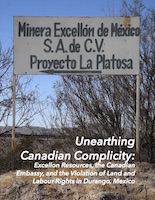 By Mining Watch Canada and United Steelworkers
By Mining Watch Canada and United Steelworkers
A report based on internal documents obtained from the Canadian Department of Foreign Affairs, Trade and Development (DFATD) concludes that Canadian diplomats in Mexico were complicit in Toronto-based Excellon Resources Inc.’s efforts to avoid redressing a violated land use contract and poor working conditions, and supported repression against a peaceful protest.
The report from MiningWatch Canada and the United Steelworkers is based on a careful review of nearly 250 pages obtained from DFATD during a period of heightened conflict and repression from July to November 2012.
At this time, landowners from the Ejido La Sierrita and workers from Local 309 of the National Miners Union at Excellon’s La Platosa mine undertook a peaceful protest for several months, after filing two formal complaints in Canada alleging serious land and labour rights violations without results.
Despite full knowledge of these complaints and Excellon’s refusal to engage in dialogue to address them, the Canadian Embassy planned to share information with Excellon that was gathered from community members and their legal counsel without their consent, while helping the company forge high level connections that led to violent repression against the protest.
“Nowhere in the internal communication reviewed for this study did we find evidence of Canada’s oft-stated policy that it encourages Canadian mining companies to act responsibly and to respect international standards. The Canadian Embassy’s one-sided support for Excellon is a blatant example of Canadian government promotion of corporate interests at the expense of workers and communities,” remarked Ken Neumann, Canadian National Director for the United Steelworkers.
The report notes that the behaviour of the Embassy could form part of a disturbing trend present in other cases and countries as well. Mexico is the principal destination for Canadian mining investment outside of Canada. Conflicts between the Canadian mining companies and local communites and workers are frequent.
Forewarned that Mexican police, army, and government officials were meeting to plan to evict the protest in response to the Embassy and company lobby, one trade commissioner wished the company well, the night before police and army moved in on the protest camp.
“The Embassy’s apparent disregard for the safety of peaceful protestors in a country where human rights activists, journalists, and community leaders are being injured and killed far too often is appalling. These findings confirm our fears that the Canadian government’s policy to harness its whole diplomatic corps to serve private interests abroad – something it calls “economic diplomacy” and announced in its Global Markets Action Plan – is bound to contribute to further harm,” said Jen Moore, Latin America Program Coordinator for MiningWatch Canada.
The disdain and repression that the Ejido La Sierrita members experienced in 2012 ended Excellon’s welcome in their community. The community has since taken action to rescind its contract with Excellon and thereby bring their relationship with the company to an end and close the silver, lead, and zinc mine.
The new report by Mining Watch Canada and United Steelworkers entitled “Unearthing Canadian Complicity: Excellon Resources, the Canadian Embassy and the Violation of Land and Labour Rights in Durango, Mexico” describes in detail the behaviour of the Canadian Embassy in Mexico.
According to the report, review of the disclosed documents revealed the following:
- There was a high degree of contact between the Embassy and Excellon management, including a clear intention on the Embassy’s part to share information gathered from community members and their legal counsel with the company without their consent;
- The Embassy actively assisted the company by lobbying key Mexican officials;
- Despite high rates of violent repression in Mexico at the hands of state armed forces, the Embassy accepted that repression be used against the Ejido La Sierrita’s peaceful protests. One trade commissioner went so far as to wish the company well the night before police and army moved in on the encampment that Ejido members had installed on private land;
- Throughout, there was a deafening silence from the Embassy with regard to any concerns pertaining to Excellon’s conduct and its refusal to address repeated complaints from workers and the community through dialogue and negotiation;
- Absent from the 244 pages obtained from DFATD is any evidence that the Embassy urged Excellon to enter into dialogue with the Ejido, to address outstanding social and environmental issues, to demonstrate respect for the freedom of association of company workers, to respect their right to protest peacefully, to avoid the use of armed repression against a peaceful protest, or to avoid disproportionate use of force when it knew armed forces would evict the community protest.
Read the Full Report here: http://www.miningwatch.ca/



